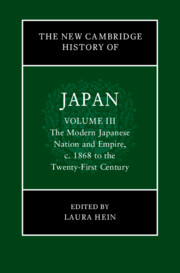Book contents
- The New Cambridge History of Japan
- The New Cambridge History of Japan
- The New Cambridge History of Japan
- Copyright page
- Contents
- Figures
- Maps
- Tables
- Contributors to Volume III
- Preface
- Maps
- Introduction
- Part I Political Sovereignty
- 1 The Transformative Politics of the Meiji Revolutions
- 2 Japan and Its Margins
- 3 The Asia-Pacific War
- 4 Japan’s Postwar Subordination to the United States and Its Structure of Dual Authority
- 5 The Politics of Citizenship in Postwar Japan
- 6 The Struggle to Protect Individual Rights in Postwar Japan
- 7 Japan’s Decline
- Part II Environment, Economy, and Technology
- Part III Social Practices and Cultures in Modern Japan
- Index
- References
7 - Japan’s Decline
The Heisei Era (1989–2019) in World History
from Part I - Political Sovereignty
Published online by Cambridge University Press: 19 May 2023
- The New Cambridge History of Japan
- The New Cambridge History of Japan
- The New Cambridge History of Japan
- Copyright page
- Contents
- Figures
- Maps
- Tables
- Contributors to Volume III
- Preface
- Maps
- Introduction
- Part I Political Sovereignty
- 1 The Transformative Politics of the Meiji Revolutions
- 2 Japan and Its Margins
- 3 The Asia-Pacific War
- 4 Japan’s Postwar Subordination to the United States and Its Structure of Dual Authority
- 5 The Politics of Citizenship in Postwar Japan
- 6 The Struggle to Protect Individual Rights in Postwar Japan
- 7 Japan’s Decline
- Part II Environment, Economy, and Technology
- Part III Social Practices and Cultures in Modern Japan
- Index
- References
Summary
The twenty-four accessible and thought-provoking essays in this volume present innovative new scholarship on Japan’s modern history, including its imperial past and transregional entanglements. Drawing on the latest Japanese and English-language scholarship, it highlights Japan’s distinctiveness as an extraordinarily fast-changing place. Indeed, Japan provides a ringside seat to all the big trends of modern history. Japan was the first non-Western society to become a modern nation and empire, to industrialize, to wage modern war on a vast scale, and to deliver a high standard of living to virtually all its citizens. Because the Japanese so determinedly acted to reshape global hierarchies, their modern history was incredibly destabilizing for the world. This intense dynamism has powered a variety of debates and conflicts, both at home and with people and places beyond Japan’s shores. Put simply, Japan has packed a lot of history into less than two centuries.
- Type
- Chapter
- Information
- The New Cambridge History of Japan , pp. 261 - 290Publisher: Cambridge University PressPrint publication year: 2023



